Ruth 4.13-22
Just after Jesus issues the promise that his yoke is easy and his burden is light, he journeys through the grainfields outside Capernaum. And his disciples are hungry. So as they follow Jesus, they pluck the heads of the wheat and roll the grain in their hands, freeing the kernel inside. Thus did the disciples of Jesus eat on the Sabbath. Ever since the scandal he caused by eating and drinking with sinners, a paparazzi of Pharisees have hounded after Jesus, hoping to catch him in the latest outrage. When they witness his disciples eating from the fields on the Sabbath, they pounce, “Look, your disciples are doing what is not lawful to do on the Sabbath.”
Jesus responds by chastising the Pharisees for condemning the guiltless before he finally declares himself to be the LORD of the Sabbath. In other words, “You want to quote the commandments at me? This is the finger that etched them in stone for Moses.”
“Is it lawful to do this on the Sabbath?!”
Of course— they should know it— the answer to their question is, “Yes!” It is lawful to do such things on the Sabbath. It does not violate the commandments for his disciples to pluck the heads of wheat in the fields, roll them in their hands, and eat the released kernel. The Sabbath commandment forbids the use of tools to harvest grain not their hands. As the LORD Jesus commanded Moses in the Book of Deuteronomy, “When you enter your neighbor's standing grain, you may pluck the ears with your hand, but you shall not put a sickle to your neighbor's standing grain.”
“Is it lawful to do this on the Sabbath?!”
Yes!
Yes it is.
Yes it is in keeping with the commandments.
They are wrong. And obviously it is not that they do not know their scriptures, it’s that they have read them badly. And because they have read their Bible badly, they are blind to what God is doing in Jesus Christ in their very midst.
We are no less guilty of being bad readers.
In the Gospel of Luke:
Just after he spins his parable about the marriage supper of the lamb, Jesus announces to the great crowds that have gathered around him, “If anyone comes to me and does not hate his own father and mother, his own wife and children, brothers and sisters, yes, and even his own life, he cannot be my disciple.” I don’t know how many literal, uncompromising, un-Christlike sermons preached by aspiring radicals I have heard on this passage. Even the editors of my Bible give it the header, “The Cost of Discipleship.” In interpreting this passage, seldom do we stop to take note of the fact that the disciple standing next to Jesus when he issues this bewildering announcement, the disciple upon whom Jesus intends to build his church, is Peter. And only a few chapters before this passage, Jesus healed the mother of Peter’s wife.
Peter appealed to Jesus to heal his wife’s mother.
If Jesus was truly saying that we must choose him over our loved ones, then Jesus would not have chosen Peter to found his church, for Peter did not leave his family in order to follow Jesus.
Again and again, we misread the scriptures.
When my cancer came back this winter, a clergy colleague, whom I only know online, sent me a Get Well card. In it, in large cursive loops, he had scrawled a verse from the Book of Jeremiah. You probably know it; it may be the only verse you know from the prophet: “For I know the plans I have for you, declares the LORD, plans for welfare and not for travail, to give you a future and a hope.”
It sounds comforting if you do not know the Book of Jeremiah.
The happy plans God promises to Jeremiah do not apply to Jeremiah. In fact, they exclude Jeremiah. Accordingly, the other happy-sounding verse you may know from Jeremiah is likewise unsettling. God singles Jeremiah out for from before his birth (“Before I formed you in the womb I knew you.”); in order, to announce good news to people that he himself will not receive.
Jeremiah is not a beneficiary of the LORD’s plans for prosperity and hope.
Jeremiah dies— doomed— in Egypt.
“Thanks so much for your thoughtful card,” I emailed the preacher back.
Over and again, we rush over the scriptures or we cherry pick them for our own predetermined purposes; so that, we end up knowing them no better than those who hounded after Jesus.
We read the parable of prodigal son, for instance, as a happy story of amazing grace rather than a haunting tale of a son who is content to celebrate without his older brother.
———————
No less than the Pharisees in the fields, we badly misread the scriptures.
Just so, we do not see what God is doing in our midst.
———————
Take another example.
We think Ruth is a story about the woman whose name the book bears.
But if so—
If Ruth is the main character of the Book of Ruth, then why does she vanish from its ending?
The story has perfect narrative symmetry. It moves seamlessly from famine to fullness. It began with empty bellies and barren wombs; it concludes with feasting and nativity. The story started with three deaths: the husbands of Orpah, Ruth, and Naomi. The story concludes with three births: Obed, Jesse, and David. The book begins with Elimelech dying in a foreign land. The book ends with the redemption of his name and the resurrection of his inheritance.
The story has perfect symmetry.
Except for one flaw.
The “main character” disappears fully from the finale.
Right at the moment she gives birth to her baby, Ruth vanishes. Not another word is uttered about her. No sooner has her baby crowned than the women of Bethlehem proclaim, “Blessed be the LORD.” They proclaim the blessing not to Ruth but to Naomi.” Then immediately the women place the newborn not in Ruth’s arms but in Naomi’s lap. And finally those same women of Bethlehem give the baby a name, Obed. His name means, “worshipper.” They name him Obed because— pay attention— “a son has been born to Naomi.”
A son has been born to Naomi.
Ruth’s disappearance from the Book of Ruth has been interpreted as a flaw in the story’s harmony and proportion. Feminist critics view Ruth’s vanishing from the story as worse than a narrative defect. Feminist critics interpret it as a sign of sin, evidence of an ancient patriarchal society that silences women, eliminates their agency, and sees them as nothing more than “cogs in the baby-making machine.” And to be sure, the Book of Ruth does end with a genealogy of male names.
But again, we are such bad readers of the scriptures!
A son has been born to Naomi.
This is not a blemish in the story. This is the story! Ruth does not disappear from the Book of Ruth. Ruth recedes from Naomi’s story.
A son has been born to Naomi.
Not—
A son has been born to Mara, the name she gives to herself after her husband and sons have died because— she says— “The LORD has dealt bitterly with me.”
“A son,” the women exclaim, “has been born to Naomi.”
This is part of the story’s perfect symmetry not an exception to it.
After all, two questions drive the plot of Ruth, two questions posited at the very beginning of the book, one question posed by Naomi and another question asked of Naomi.
The Book of Ruth is but the answer to those two questions.
Remember.
At the start of the story, when the widows of Naomi’s sons attempt to accompany their mother-in-law back to Bethlehem, Naomi— who’s convinced the judgment of the LORD is against her— says to Ruth and Orpah, “Turn back, my daughters; why will you go with me? Have I yet sons in my womb?”
That’s a pregnant question to ask.
Even a bad reader of the Bible knows that the Living God— the God who rescued Israel from slavery and raised Jesus from the dead— specializes in occupied tombs and barren wombs.
“Go back,” Naomi implores them, “Will I have yet more sons?”
Later, when they first arrive in Bethlehem, the women of Bethlehem (the same women who will lay Ruth’s baby in Naomi’s lap) look at Naomi— famished and bitter, grieving and barren of all hope— and they ask, “Is this Naomi?” That is, “Naomi, you are no longer who we knew you to be.” Which is to say, “Can the woman who now calls herself Mara (Bitterness) be made Naomi again?”
Ruth is a stranger to Israel and a mother to Israel, yes, but Naomi is Israel. She struggles with God and she prevails, “A son has been born to Naomi.”
The question asked by Naomi and posed to Naomi at the beginning of the story are the questions at the heart of biblical faith:
“Is anything too wonderful for the LORD?”
“Is anything impossible for God?"
“Is love stronger than death?”
“Can these bones live?”
“Have I yet sons in my womb?”
“Can Mara be made Naomi again?”
“Can Bitterness be turned back to Sweetness?”
Ruth is not the main character of the Book of Ruth. Naomi is. Ruth is but one of the means by which the LORD answers those two questions— which are really one question— posed at the beginning of the book. In other words, (despite what you may have heard from bad readers of the Bible) the Book of Ruth is about God.
———————
One morning, years ago, I sat in the surgical waiting room in Charlottesville at the University of Virginia hospital, waiting with David’s wife. Ashley was blond and pretty and sweet. She was the kind of person to whom it had never occurred to tell even a white lie. Ashely’s face was tanned from all the camping they had tried to squeeze into their schedule while there was still time. A silver cross hung around Ashley’s neck; it was a bigger version of the ones she’d given to their son and daughter when they’d started to serve as acolytes.
Ashley’s husband, David, was only a few years older than me. He’d lived every day of his life in the same small town and wouldn’t have had it any other way. He had been baptized and raised and was now raising his own two kids in the church I pastored. Ever since graduating from high school, David had worked in the local carpet factory and had served as the captain of the volunteer fire department. When I first met him, he hadn’t worked in a year, not since ALS had begun its monotonous mutiny against his body. Shortly after I had arrived as the new preacher, David had driven me in his battered, red F150 all over the hills he had hunted and hiked. He wanted to get to know me better, he said, because he thought I’d likely be doing his funeral.
Too soon after David had driven me through the Blue Ridge, I drove them over those same mountains to the hospital; so that, David could have a feeding tube installed into his body. I sat next to Ashley in the waiting room. I listened as she mulled over how she had explained this latest step to their kids and anguished over whether she had done it wrong. I watched as she leafed again through the folder filled with instructions and warnings a nurse had handed her. I handed her a tissue when I saw that she was about to cry.
Again.
Through sniffles and with tears, she confessed to me her worries and fears and exhaustion. She told me she was terrified what David’s long, slow death would do to their children.
“It’s like they’re watching him be tortured to death,” she whispered.
And then she hung her head.
And she started to cry.
Again.
When she stopped, she looked up at me with fierce curiosity in her eyes.
“Will I ever be happy again?”
———————
In his book Four Hundred Texts on Love, the church father Maximus the Confessor writes:
“God ordained that nothing be more conducive for our becoming God—if I may speak thus—than mercy given from the heart with pleasure and joy to those in need. For the Word has shown that the one who is in need of having good done to him is God; but also, the one who can do good and who does it is truly God by grace. And if the poor man is God, it is because of God’s condescension in becoming poor for us. All the more reason, then, will that one be God who by loving human beings in imitation of God heals by himself in a God-fitting way the sufferings of those who suffer and who shows that he has in his disposition, in due proportion, the same power of sustaining providence that God has.”
To put it plain:
We are the providence of God.
You are how God does God to others.
The LORD answers your prayers, he addresses your empty places, he responds to your barren hopes, in no other way but the people around you.
You are how God does God to your neighbor.
Your neighbor is how God does God to you.
We are the providence of God.
———————
When we read the Book of Ruth like the Pharisees in the fields read the Torah, that is, when we read it lazily or hastily; or, when we treat the Book of Ruth merely as an account about Christ’s genealogy rather than Jesus’s Word to us, then it becomes easy to think that God is not an actor within the story. If we take Ruth to be the main character of Ruth, then the LORD appears to have no role or voice in the narrative. After all, nowhere in the Book of Ruth do we read the words, “And God said to Ruth.” God appears on the lips of Naomi and Boaz, but he does not appear to them. There is no heavenly host in this Bethlehem. God is not listed in the story’s dramatis personnae.
But when you notice that the Book of Ruth is actually about Naomi— or, better yet, the book is the answer to those two questions asked at its beginning— then you can see that over and over again in the book, the characters in the story ask God to do something that they themselves end up doing.
Ruth prays that Naomi’s people would become her people and Naomi’s God her God. But then it is Ruth, in what St. Ephrem the Syrian calls “erotic audacity,” who takes matters into her own hands and makes Naomi’s people her people and, thus, their God her God. Again and again, the characters ask God to do something they end up doing. Naomi prays that God would be to Ruth as Ruth as been to Naomi, but as soon as they arrive in Bethlehem, Naomi plays that role to Ruth, plotting for her to find a redeemer. Boaz prays that Ruth would find shelter in the shadow of God’s wing, but by the end of the story Ruth has found protection under the shadow of Boaz’s wing.
Boaz turns out to be how God answers Boaz’s prayer.
He is the providence of God.
———————
“Have I yet sons in my womb?”
Yes!
This is the God who specializes in tombs and wombs.
“A son has been born to Naomi.”
It is not that God is absent in the story. It is that God fills the entire story with his own life. God is fully embodied in the characters of this story. Their movements are God’s movements. Ruth and Boaz, the women of Bethlehem and the reapers in the fields— for Naomi’s sake, they are the providence of God.
God’s providence is not something behind the story. It is the story. It is not invisible. It is incarnated in the lives of the people of Bethlehem.1 God doesn’t fix Naomi’s loss by snapping his fingers from his seat in heaven. God doesn’t answer her bitter question by declaring, “Thus says the LORD.” No, God does it by Ruth walking the gleaning fields. God does it by the men and women of Bethlehem choosing grace over the commandments. God does it by Boaz obeying an obscure law in order to redeem Ruth; so that, through Ruth, Naomi is be made Naomi again, with a son on her lap.
It is not that God is not in the story. It is that God’s providence wears sandals. It gathers barley. It walks into town and bargains at the city gate. It carries sheaves back home. It welcomes a stranger. It even risks shame and seduces a rich man.
As Chris Green writes, “God is happy for his providence always to remain unsearchable.” Or as Simone Weill says, “The devil dazzles; God does not.” That is, God is so humble— because Jesus is God— that he joyfully hides in the ordinary lives entwined with yours. God’s work is deeper than your perception but it is as near to you as your neighbor.
———————
“Will I ever be happy again?” Ashley asked me, “Right now, it feels impossible.”
And then she covered her mouth, “Is that a horrible thing to wonder?”
I shook my head.
“There couldn’t be a more biblical question to ask.”
“Well, I just wish God would show up and tell me so already.”
“The faith isn’t magic,” I replied, “It’s mystery.”
She nodded but I could tell she didn’t follow.
“For God to allay all your fears and worries by appearing to you in all his Almightiness— to give you a sign— is to want him to be someone other than who he is. Like it or not, he prefers to show up as someone like me, assuring you that everything is going to be okay.”
She nodded.
And then she smiled, “You’d think God would show up as someone who’s a better driver than you.”
I looked at her, wanting to see the seriousness in my eyes.
“You can be happy again,” I said, “The Bible tells me so. I don’t know how God will do it. But I do have an idea through whom he will do it.”
———————
This is the word of the LORD to you.
You can be Naomi again.
If you think God has dealt bitterly with you, if you grieve the loss of more love than you dare count, if life has left you famished and exhausted, if your future feels as empty as your hopes are barren, if your present seems defined by what is absent, this is the word of the LORD to you.
You can be Naomi again.
Pat Sherfey— you can be Naomi again.
Pam Jones— you can be Naomi again.
Bob Kallal— you can be Naomi again.
Shirley Hanson, Mary Chambers, Jane Underhill, Kelly Watts…I could run through the church directory, A-Z, the promise stands because the Book of Ruth is not a story about the genealogy of Jesus.
It is a word from Jesus.
Let the bitter and broken-hearted believe!
You can be Naomi again.
Listen.
This is the word of the LORD to you.
God does not abandon the bitter.
He will make your life sweet again.
God does not forget the empty.
He will fill you— if not with what you want, then with himself.
God does not despise the grieving.
There is yet a future for you.
You will be happy again.
God gives sons again.
God gives names again.
God gives bodies back.
He gives hope.
Again.
But look around you.
It’s not magic. It's mystery. God does it in no other way but through the people around you. Right this very moment, you’re sitting next to and in front of and behind the providence of God— he is so humble, he’s hiding behind all of it.
To live by faith is to live by sight.
———————
But such vision does not come easy.
Again— the devil dazzles; God does not.
Fortunately, Jesus promises there is something even more blessed than to so see him. That is, to taste him. When Christ says to Thomas, “Blessed are those who have not seen and yet have come to believe,” he’s pointing you to loaf and cup. So all of you who wonder if you can become Naomi again, come to the table.
Taste-and-see that the LORD is good.
He specializes in barren wombs and sealed tombs.
Come.
Be filled.
Cameron Combs, “Ruth is Incarnation.”




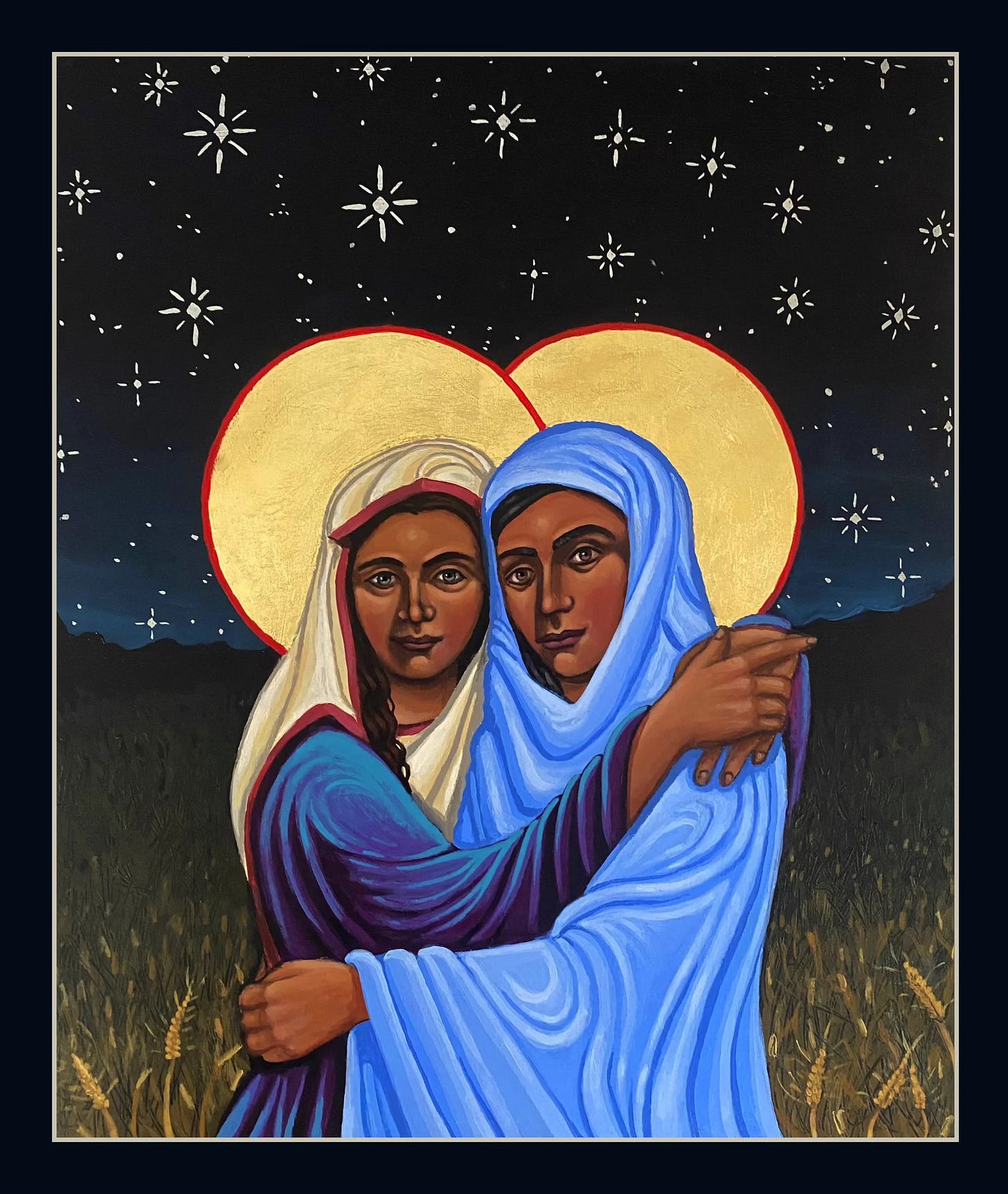
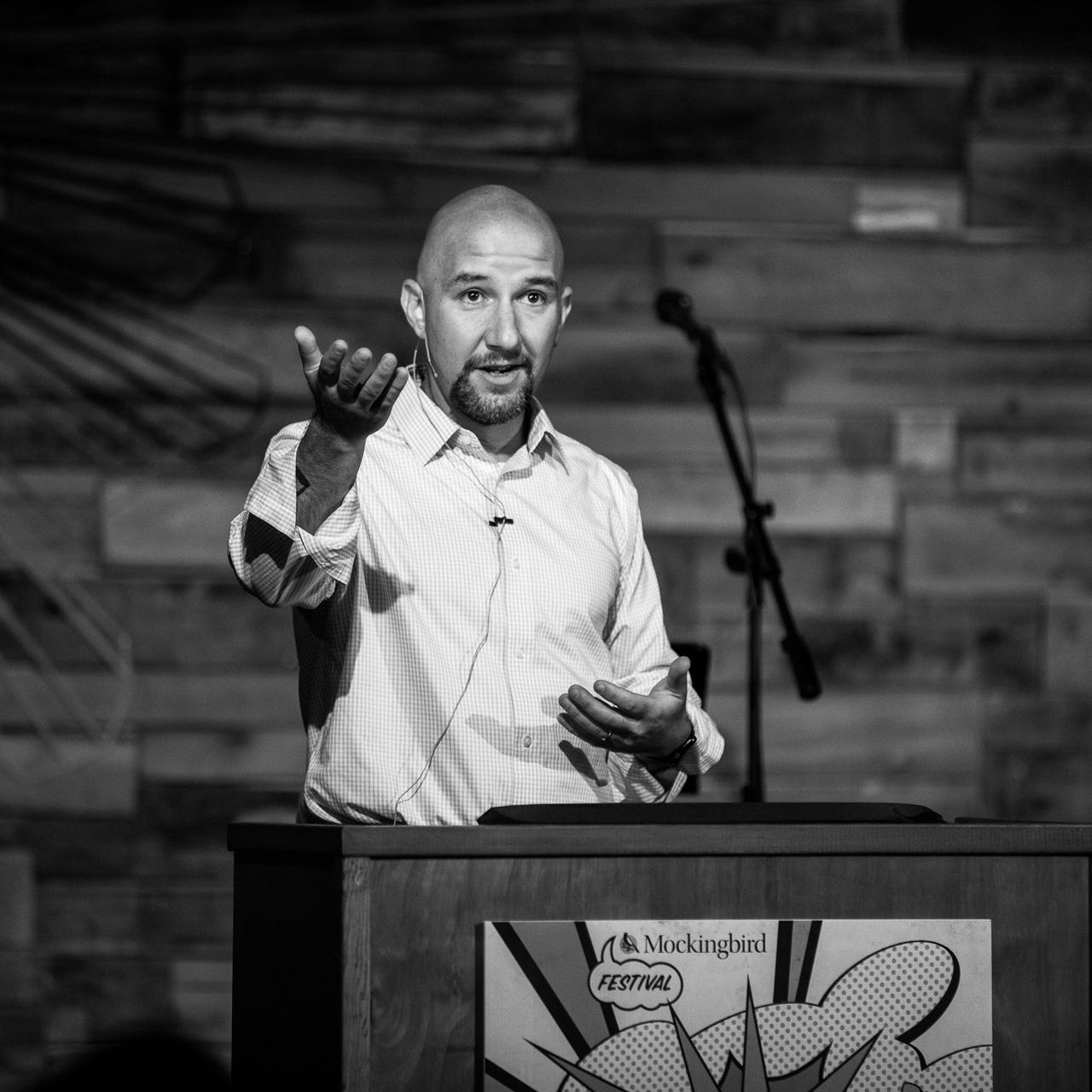


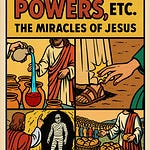


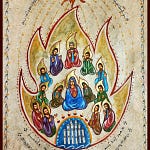
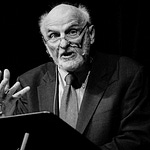
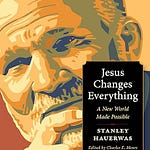
Share this post